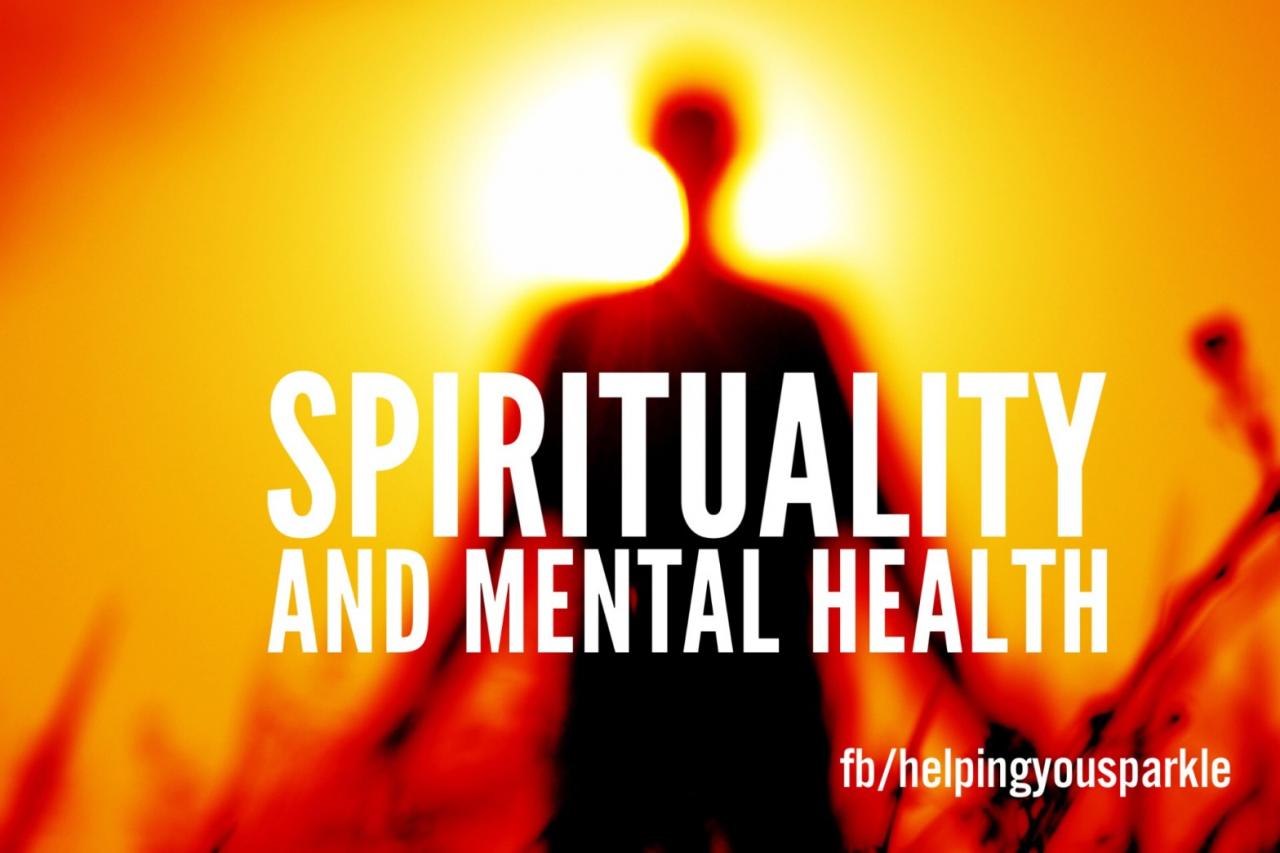Spirituality and Mental Health: A Powerful Connection

Spirituality and mental health are intertwined in ways that have long been recognized by various cultures and traditions. This interconnectedness is not merely a matter of belief but is backed by scientific evidence demonstrating the positive impact of spiritual practices on mental well-being.
From ancient wisdom to modern research, the relationship between spirituality and mental health continues to be a compelling area of exploration.
Throughout history, spirituality has served as a source of comfort, purpose, and resilience for individuals facing life’s challenges. Spiritual practices such as meditation, mindfulness, and prayer have been shown to reduce stress, anxiety, and depression while fostering emotional well-being.
Furthermore, connecting with nature, engaging in acts of service, and cultivating gratitude and forgiveness can significantly contribute to a healthier mental state.
The Intertwined Nature of Spirituality and Mental Health
The connection between spirituality and mental health has been recognized throughout history and across cultures. Many spiritual traditions have long emphasized the importance of inner peace, mindfulness, and a sense of purpose in promoting well-being. While modern science is increasingly exploring this relationship, the ancient wisdom of spiritual practices continues to offer valuable insights into the human experience.
Historical and Cultural Perspectives
Throughout history, spirituality has played a significant role in addressing mental health concerns. Ancient civilizations, such as the Greeks and Egyptians, developed elaborate rituals and belief systems that aimed to restore mental balance and harmony. In many cultures, spiritual practices like prayer, meditation, and rituals have served as coping mechanisms for stress, anxiety, and other mental health challenges.
For example, in Buddhism, mindfulness practices are central to promoting mental clarity and emotional regulation. Similarly, in Hinduism, yoga and meditation are integral to achieving inner peace and transcending suffering. These practices have been passed down through generations, providing individuals with a framework for navigating life’s challenges and finding meaning in their experiences.
Scientific Evidence for the Positive Impact of Spiritual Practices
Research in recent decades has begun to shed light on the biological and psychological mechanisms underlying the connection between spirituality and mental health. Studies have shown that engaging in spiritual practices can lead to several positive outcomes, including:
- Reduced stress and anxiety
- Improved mood and sense of well-being
- Increased resilience and coping skills
- Enhanced social support and a sense of community
For instance, studies have found that meditation can reduce activity in the amygdala, the part of the brain associated with fear and anxiety. Prayer has also been shown to increase levels of oxytocin, a hormone associated with bonding and social connection.
These findings suggest that spiritual practices can have a tangible impact on our brains and bodies, contributing to improved mental health.
Examples of How Different Spiritual Traditions Address Mental Health Concerns
Different spiritual traditions offer diverse approaches to addressing mental health concerns. Here are some examples:
- Buddhism: Mindfulness practices, such as meditation and vipassanā, are central to understanding and managing negative emotions. These practices cultivate present-moment awareness and acceptance, helping individuals to detach from unhelpful thoughts and feelings.
- Christianity: Prayer, scripture study, and community support are often used to address mental health challenges. Christians may find solace and strength in their faith, drawing upon the teachings of Jesus and the promise of divine love and grace.
- Islam: The Quran emphasizes the importance of seeking knowledge, patience, and reliance on God. Muslims may find comfort in reciting verses from the Quran, performing acts of charity, and connecting with their community.
These examples demonstrate how spiritual traditions can provide individuals with a sense of purpose, meaning, and support, fostering mental well-being and resilience.
Spiritual Practices and Mental Health Benefits: Spirituality And Mental Health

Spiritual practices, such as meditation, mindfulness, prayer, gratitude, forgiveness, connecting with nature, and acts of service, have been increasingly recognized for their profound impact on mental health. These practices offer a holistic approach to well-being, addressing not only the physical but also the emotional, mental, and spiritual aspects of our existence.
Meditation and Mindfulness, Spirituality and mental health
Meditation and mindfulness are practices that involve focusing attention on the present moment without judgment. They help to cultivate a sense of calm, reduce stress, and promote emotional regulation. Studies have shown that meditation can reduce anxiety, depression, and symptoms of post-traumatic stress disorder (PTSD).
Mindfulness, on the other hand, helps to develop awareness of thoughts, feelings, and bodily sensations, enabling individuals to respond to challenges with greater clarity and resilience.
Prayer
Prayer is a spiritual practice that involves communicating with a higher power. It can provide solace, comfort, and a sense of connection to something larger than oneself. Studies have shown that prayer can reduce stress, anxiety, and depression. It can also promote feelings of hope, purpose, and meaning in life.
Gratitude and Forgiveness
Gratitude and forgiveness are essential for emotional well-being. This involves focusing on the positive aspects of life and fostering an appreciation for the good things we have. Forgiveness, on the other hand, involves letting go of resentment and anger towards oneself or others.
Research has shown that both gratitude and forgiveness can reduce stress, anxiety, and depression, and improve overall well-being.
Connecting with Nature
Spending time in nature has been shown to have numerous benefits for mental health. Being surrounded by greenery, fresh air, and natural light can reduce stress, anxiety, and depression. It can also improve mood, attention, and creativity.
Acts of Service
Engaging in acts of service, such as volunteering or helping others, can have a positive impact on mental health. It promotes feelings of purpose, connection, and gratitude. Studies have shown that acts of service can reduce stress, anxiety, and depression, and increase happiness and life satisfaction.
Spirituality as a Source of Meaning and Purpose
Spirituality can be a powerful source of meaning and purpose in life, offering individuals a framework for understanding their place in the world and providing a sense of direction and motivation. By connecting individuals to something greater than themselves, spirituality can foster a sense of belonging, transcendence, and hope, even in the face of life’s inevitable challenges.
Spirituality and the Search for Meaning
The search for meaning is a fundamental human need. Spirituality provides a framework for understanding the universe, our place within it, and the purpose of our existence. It offers a sense of connection to something larger than ourselves, be it a higher power, nature, or a set of values and beliefs.
This connection can provide a sense of purpose, direction, and belonging, which can be particularly important during times of uncertainty or change.
- Belief Systems: Many spiritual traditions offer a set of beliefs and values that provide a framework for understanding the world and our place within it. These beliefs can provide a sense of order, meaning, and purpose, guiding individuals in their decisions and actions.For example, the belief in karma in some Eastern religions can provide a framework for understanding the consequences of our actions and encourage ethical behavior.
- Rituals and Practices: Spiritual practices such as prayer, meditation, and service can provide a sense of connection and purpose. These practices can help individuals to focus their attention, cultivate inner peace, and connect with their values. For example, daily meditation can help individuals become more aware of their thoughts and feelings, fostering self-reflection and a sense of inner peace.
- Community: Many spiritual traditions emphasize the importance of community and belonging. Connecting with others who share similar beliefs and values can provide a sense of support, connection, and purpose. These communities can offer a sense of belonging, shared purpose, and a network of support during challenging times.
Spirituality and Resilience
Spirituality can play a significant role in fostering resilience, the ability to bounce back from adversity. By providing a sense of hope, meaning, and purpose, spirituality can help individuals cope with challenges, maintain a positive outlook, and find strength in difficult times.
- Hope and Optimism: Spiritual beliefs often offer a sense of hope and optimism, even in the face of adversity. The belief in a higher power, a positive afterlife, or the interconnectedness of all things can provide comfort and strength during difficult times.For example, the belief in reincarnation in some religions can offer a sense of hope and purpose, even in the face of death.
- Acceptance and Forgiveness: Spirituality can encourage acceptance of difficult experiences and promote forgiveness, both of oneself and others. This can be particularly helpful in coping with grief, loss, and trauma. For example, the concept of forgiveness in Christianity can help individuals to let go of anger and resentment, fostering inner peace and healing.
- Meaning-Making: Spirituality can help individuals find meaning in challenging experiences. By connecting suffering to a larger purpose or understanding it as a necessary part of a spiritual journey, individuals can find strength and resilience. For example, the concept of suffering as a catalyst for growth in Buddhism can help individuals find meaning in difficult experiences and develop compassion for themselves and others.
Spirituality and Coping with Grief and Loss
Spiritual beliefs and practices can offer comfort and support in the face of grief and loss. They can provide a framework for understanding death, a sense of connection to loved ones who have passed, and hope for the future.
- Belief in an Afterlife: Many spiritual traditions offer a belief in an afterlife, which can provide comfort and hope to those who are grieving. The belief in a reunion with loved ones in a spiritual realm can provide a sense of peace and closure.
- Rituals and Practices: Spiritual rituals and practices, such as prayer, meditation, and memorial services, can help individuals process grief and connect with their loved ones who have passed. These practices can provide a sense of comfort, support, and meaning.
- Community Support: Spiritual communities can offer support and comfort during times of grief. Connecting with others who share similar beliefs and values can provide a sense of belonging, understanding, and support.
Addressing Spiritual Distress and Mental Health

Spiritual distress is a state of suffering or anguish related to one’s sense of meaning, purpose, connection to something greater than oneself, or faith. It can manifest in various ways, including feelings of isolation, emptiness, loss of hope, or questioning one’s beliefs.
The Impact of Spiritual Distress on Mental Health
Spiritual distress can have a profound impact on mental health, often exacerbating existing conditions or contributing to the development of new ones. It can lead to:
- Increased anxiety and depression: When individuals struggle with their spiritual beliefs or feel disconnected from a higher power, they may experience heightened feelings of anxiety and despair.
- Difficulty coping with stress: A strong spiritual foundation can provide individuals with a sense of purpose and resilience, enabling them to navigate life’s challenges more effectively. When this foundation is shaken, individuals may find it harder to cope with stress and adversity.
- Suicidal thoughts and behaviors: In extreme cases, spiritual distress can contribute to suicidal ideation or attempts. When individuals lose their sense of meaning and purpose, they may feel hopeless and believe that life is no longer worth living.
Integrating Spiritual Practices into Mental Health Treatment Plans
Spiritual practices can play a significant role in promoting mental well-being and addressing spiritual distress. By incorporating these practices into treatment plans, mental health professionals can provide a holistic approach to care.
- Mindfulness and Meditation: These practices can help individuals become more aware of their thoughts and feelings, reducing stress and anxiety. By cultivating a sense of presence, individuals can connect more deeply with their inner selves and find solace in the present moment.
- Prayer and Rituals: Engaging in prayer or religious rituals can provide a sense of connection to a higher power, offering comfort and support during times of difficulty. These practices can also foster a sense of community and belonging, which are crucial for mental well-being.
- Nature Connection: Spending time in nature can have a profound impact on mental health, reducing stress and promoting feelings of peace and tranquility. It can also provide opportunities for reflection and contemplation, fostering a sense of connection to something larger than oneself.
- Creative Expression: Engaging in creative activities such as art, music, or writing can be a powerful way to process emotions and express spiritual beliefs. It can also provide a sense of purpose and accomplishment, boosting self-esteem and overall well-being.
Resources and Support Groups
For individuals seeking spiritual guidance and support, various resources and support groups are available. These resources can provide a safe and supportive environment for exploring spiritual concerns, connecting with others who share similar experiences, and finding meaning and purpose in life.
- Religious Institutions: Many religious institutions offer counseling, support groups, and spiritual guidance to individuals facing challenges related to their faith. These institutions can provide a sense of community and belonging, fostering a sense of hope and resilience.
- Spiritual Retreats and Workshops: Retreats and workshops designed to promote spiritual growth and well-being can provide individuals with opportunities for self-reflection, meditation, and connection with others. These programs can offer valuable tools and insights for addressing spiritual distress and fostering mental health.
- Online Support Groups: Online support groups and forums can provide a platform for individuals to connect with others who share similar spiritual experiences and challenges. These groups can offer a sense of community, understanding, and support, helping individuals feel less alone in their journey.
Ethical Considerations in Spirituality and Mental Health

The intersection of spirituality and mental health raises significant ethical considerations, demanding careful navigation to ensure respect for individual beliefs and promote well-being.
Respecting Diverse Spiritual Beliefs and Practices
Respecting diverse spiritual beliefs and practices is paramount in mental health care. This means acknowledging that individuals may hold different religious or spiritual views, engage in various practices, and have unique interpretations of their faith. It is essential to:
- Recognize and value the diversity of spiritual beliefs and practices: This involves understanding the various religious traditions, spiritual practices, and personal beliefs that individuals may hold. It is crucial to avoid imposing one’s own beliefs or assuming that everyone shares the same spiritual understanding.
- Avoid imposing religious or spiritual beliefs on clients: Mental health professionals should refrain from pushing their own religious or spiritual views on clients. Instead, they should focus on understanding and respecting the client’s beliefs and practices.
- Provide culturally sensitive care: This involves adapting mental health interventions to be congruent with the client’s cultural and spiritual background. This may include incorporating spiritual practices into therapy, seeking consultation from spiritual leaders, or finding culturally appropriate resources.
Potential Risks and Benefits of Integrating Spirituality into Mental Health Interventions
Integrating spirituality into mental health interventions can offer benefits, but it also presents potential risks that require careful consideration.
- Benefits:
- Increased sense of meaning and purpose: Spirituality can provide individuals with a sense of meaning and purpose in life, which can be particularly helpful for those struggling with mental health challenges.
- Enhanced coping mechanisms: Spiritual practices can offer coping mechanisms for dealing with stress, anxiety, and other mental health symptoms. For example, prayer, meditation, or connecting with a spiritual community can provide solace and support.
- Improved overall well-being: Research suggests that individuals who engage in spiritual practices tend to have better overall well-being, including improved mental health.
- Risks:
- Coercion or manipulation: There is a risk that spiritual interventions could be used to coerce or manipulate individuals, particularly those who are vulnerable or in crisis. It is crucial to ensure that spiritual practices are integrated into treatment in a way that is ethical and respectful of the client’s autonomy.
- Potential for harm: Some spiritual practices, if not conducted appropriately, could potentially be harmful. For example, certain types of fasting or rituals might pose risks to individuals with certain medical conditions.
- Lack of evidence: While there is growing evidence supporting the benefits of spirituality for mental health, there is still a need for more rigorous research to establish the effectiveness of specific spiritual interventions.
Ethical Considerations Related to Spiritual Guidance and Counseling
Providing spiritual guidance and counseling raises unique ethical considerations. It is essential to:
- Maintain professional boundaries: Mental health professionals should maintain clear professional boundaries when providing spiritual guidance. This means avoiding personal religious proselytizing or offering unqualified spiritual advice.
- Respect client autonomy: Clients should be free to choose whether or not they want to engage in spiritual aspects of therapy. It is crucial to respect their autonomy and avoid pressuring them to participate in practices that they are uncomfortable with.
- Seek appropriate training and supervision: If a mental health professional chooses to integrate spirituality into their practice, it is important to seek appropriate training and supervision in this area. This will help ensure that they are competent and ethical in their approach.
Future Directions in Spirituality and Mental Health Research

The intersection of spirituality and mental health is a burgeoning field with immense potential for advancing our understanding of human well-being. As research continues to explore this complex relationship, several promising areas of inquiry are emerging. These areas hold the key to developing more effective and culturally sensitive interventions that can empower individuals to harness the transformative power of spirituality for improved mental health outcomes.
Emerging Areas of Research in Spirituality and Mental Health
The field of spirituality and mental health research is expanding rapidly, with researchers exploring a wide range of topics. Some of the most promising areas of inquiry include:
- The neurobiological mechanisms underlying the link between spirituality and mental health: Investigating how spiritual practices influence brain activity and neurotransmitter levels, and how these changes contribute to improved mental well-being.
- The role of spirituality in promoting resilience and coping with stress: Examining how spiritual beliefs and practices help individuals navigate challenging life events and maintain psychological well-being.
- The impact of spirituality on mental health outcomes in diverse populations: Investigating how spirituality influences mental health experiences across different cultural, racial, and socioeconomic groups.
- The integration of spiritual practices into evidence-based mental health interventions: Exploring the feasibility and effectiveness of incorporating spiritual practices into psychotherapy and other mental health treatments.
Culturally Sensitive Interventions Incorporating Spiritual Practices
Developing culturally sensitive interventions that incorporate spiritual practices is crucial for ensuring that mental health care is accessible and effective for diverse populations.
- Understanding the nuances of spirituality across cultures: Recognizing that spirituality manifests in different ways across cultures and incorporating these diverse expressions into interventions.
- Tailoring interventions to specific cultural contexts: Designing interventions that resonate with the values, beliefs, and practices of the target population.
- Collaborating with spiritual leaders and communities: Engaging with spiritual leaders and communities to ensure that interventions are culturally appropriate and respectful.
The Role of Technology in Facilitating Spiritual Connections and Supporting Mental Well-being
Technology is playing an increasingly significant role in facilitating spiritual connections and supporting mental well-being.
- Online platforms for spiritual communities: The rise of online platforms for spiritual communities provides individuals with opportunities to connect with like-minded individuals, access spiritual resources, and participate in virtual rituals.
- Mobile apps for mindfulness and meditation: Numerous mobile apps offer guided meditations, mindfulness exercises, and other tools to promote relaxation and stress reduction.
- Virtual reality experiences for spiritual exploration: Virtual reality technology is being used to create immersive experiences that simulate spiritual practices and environments, offering individuals opportunities for deeper spiritual exploration and connection.
Last Recap

The exploration of spirituality and mental health unveils a profound relationship that can empower individuals to navigate life’s complexities with greater strength and well-being. By understanding the multifaceted ways in which spirituality can positively impact mental health, we can cultivate a deeper appreciation for the interconnectedness of our inner and outer worlds.
Whether it’s through incorporating spiritual practices into daily life, seeking support from faith communities, or engaging in meaningful acts of service, embracing the power of spirituality can contribute to a richer and more fulfilling life.
Comments are closed.